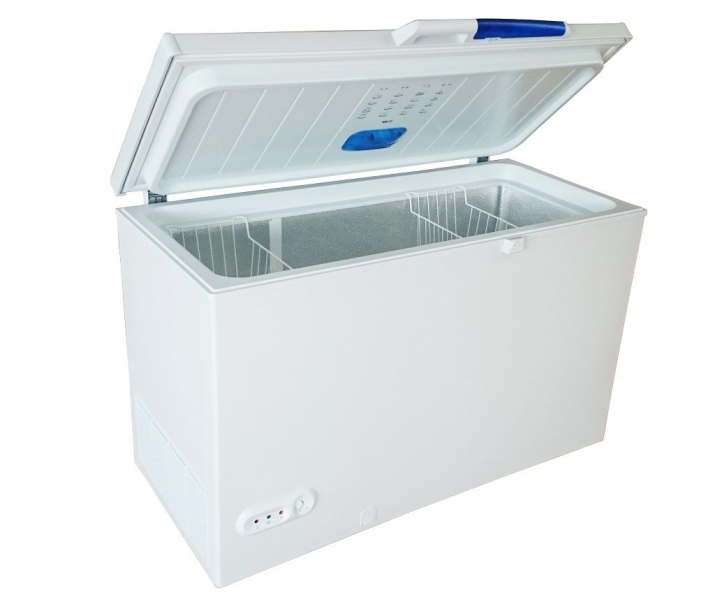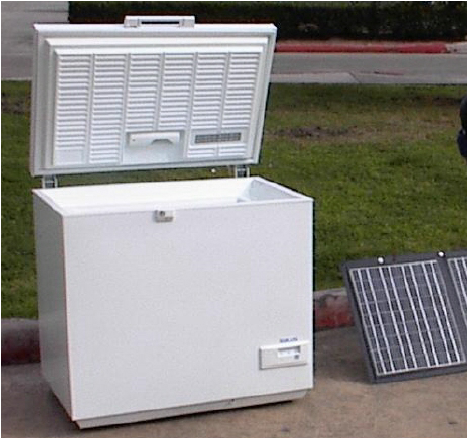The Importance of Solar Refrigerator in Modern Renewable Resource Practices
The assimilation of solar refrigerators within contemporary eco-friendly power practices represents a substantial innovation in sustainable technology. By using solar power for cooling, these systems not just decrease dependence on conventional energy resources yet likewise address vital concerns such as food preservation and accessibility to important medications in remote regions. As we explore the devices, applications, and environmental implications of solar refrigeration, it comes to be evident that this technology might play an essential duty fit our energy future. What continues to be to be taken a look at is how this innovation can be scaled and enhanced for broader impact. solar refrigerator.
Advantages of Solar Refrigerators
Solar fridges consistently supply many advantages that make them an appealing option for both household and industrial usage. One of the main benefits is their capacity to harness eco-friendly energy, considerably minimizing dependence on standard electrical energy resources. This not just lowers power costs however also adds to ecological sustainability by lowering greenhouse gas discharges.
One more trick benefit is their performance in remote areas where standard power supply may be undependable or missing. Solar fridges enable people and businesses to preserve food security and preserve disposable products, thereby enhancing food safety in underserved locations.
Furthermore, solar refrigerators generally need reduced upkeep compared to traditional versions, as they have less moving components. solar refrigerator. This results in increased sturdiness and longevity, offering a cost-effective option over time. They also run silently, adding to a more pleasurable living or working environment
Additionally, the adoption of solar refrigeration innovation aligns with international efforts to advertise tidy power remedies and fight environment adjustment. By spending in solar refrigerators, consumers not only benefit directly but additionally add to more comprehensive sustainability efforts, making them a forward-thinking choice for the modern-day age.
How Solar Refrigerators Work

Solar fridges generally consist of a battery storage space system to make certain performance throughout periods of low sunshine or nighttime. When sunshine is bountiful, the PV panels generate electrical power to operate the compressor and charge the batteries. The stored power can then be made use of when solar power is insufficient, maintaining a constant temperature level inside the fridge.
Several solar fridges additionally integrate energy-efficient parts, such as LED lights and high-performance insulation, to reduce power consumption. The effectiveness of these devices is even more boosted by passive cooling techniques, which can consist of reflective surfaces and thermal mass materials that help preserve trendy temperature levels.
Applications in Off-Grid Locations

In remote areas, where standard refrigeration alternatives are often impractical or not available, solar refrigerators supply a sustainable option. They make it possible for local farmers to store subject to spoiling fruit and vegetables, thus lowering waste and boosting food protection. Furthermore, in health care setups, solar fridges guarantee that vaccines and vital drugs continue to be viable, contributing to much better wellness end results for populations that could otherwise encounter substantial obstacles to health care accessibility.
Furthermore, the release of solar refrigerators in off-grid locations can stimulate neighborhood economic situations by helping with the facility of local business, such as food processing and distribution. As these neighborhoods get to trusted refrigeration, they can engage in value-added activities, ultimately resulting in boosted source of incomes. The fostering of solar refrigeration technology represents not just a sensible reaction to power obstacles however also a calculated financial investment in the strength and sustainability of off-grid areas.
Ecological Influence and Sustainability
The assimilation of solar fridges into power systems substantially enhances ecological sustainability by minimizing reliance on nonrenewable fuel sources and reducing greenhouse gas emissions. By utilizing solar energy, these fridges run without the need for conventional electrical energy, which is commonly generated from nonrenewable fuel source resources. This transition not only stops carbon impact but additionally advertises cleaner air high quality, as less pollutants are launched right into the ambience.
Moreover, solar fridges are created to be energy-efficient, commonly making use of sophisticated insulation technologies and energy administration systems. These features more decrease energy consumption, causing an extra sustainable cycle of use. In rural and off-grid locations, solar refrigerators provide necessary cooling without Recommended Reading the ecological costs related to diesel generators or various other fossil fuel-based systems.
Furthermore, the adoption of solar refrigeration adds to the decrease of food wasting, thus lowering food waste and its associated ecological impacts. As food manufacturing and waste find more are significant factors to greenhouse gas discharges, boosting food preservation with sustainable cooling methods plays a crucial role in general ecological stewardship. Solar refrigerators not just stand for a technological innovation yet also straighten with wider goals of sustainability and eco-friendly duty.

Future of Solar Refrigeration
Picturing a future where solar refrigeration comes to be the norm discloses its prospective to transform the means we approach cooling down and food conservation. As developments in solar modern technology proceed to evolve, solar refrigerators are anticipated to become more reliable, cost effective, and available. This shift will not just lower reliance on nonrenewable fuel sources but likewise significantly lower greenhouse gas discharges connected with conventional refrigeration methods.
Ingenious layouts, such as solar-powered absorption and thermoelectric refrigerators, are likely to get traction, specifically in off-grid and country areas. The integration of smart modern technologies, including IoT capabilities, will certainly improve user experience and maximize energy intake. The incorporation of energy storage space remedies will certainly allow solar refrigerators to supply regular air conditioning even during durations of low sunshine. solar refrigerator.
The agricultural sector stands to benefit exceptionally, as solar refrigeration can extend the life span of subject to spoiling items, minimizing food waste and enhancing food safety. As governments execute encouraging plans and motivations, coupled with raised consumer awareness, solar refrigeration could end up being a common technique throughout numerous sectors. Inevitably, the future of solar refrigeration promises a lasting and reliable strategy to cooling, fundamentally changing food conservation and power usage worldwide.
Final Thought
In summary, solar refrigerators represent a critical improvement in renewable resource methods, providing countless benefits read review including decreased reliance on nonrenewable fuel sources and boosted food conservation in off-grid locations. Their operation utilizes solar energy successfully, therefore advertising sustainability and decreasing ecological influence. As innovation remains to progress, the possibility for solar refrigeration to contribute to local economies and more comprehensive sustainability objectives will likely broaden, reinforcing its relevance in the shift in the direction of a cleaner, more lasting energy future.